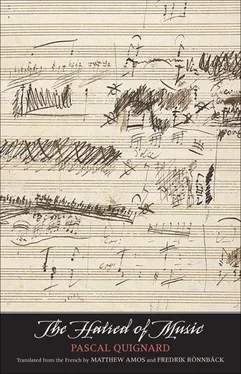
It so happens that the infinite nature of passivity (invisible forced reception) has its foundation in human hearing. This is what I bring together in the formula: ears have no eyelids.

To hear is to be touched from afar.
Rhythm is linked to vibration. That is how music creates an involuntary intimacy between juxtaposed bodies.

To hear is to obey. To listen in Latin is obaudire. Obaudire has survived in French as obéir . Hearing, audientia , is an obaudientia , is an obedience.

The sounds children hear are not born at the moment of their birth. Long before being able to emit sounds, they begin to obey the maternal, or at least the unknowable, preexisting, soprano, muffled, warm, enveloping sonata. Genealogically — at the limit of the genealogy of each person — obedience prolongs the sexual attacca of the procreating embrace.
Polyrhythmia — bodily, cardiac, then howling and respiratory, then famished and screaming, then motive and gurgling, then linguistic — is as acquired as it seems spontaneous: these rhythms are more mimetic and these lessons more contagious than they are voluntarily activated. Sound is never quite liberated from the movement of the body that causes it and that it amplifies. Never will music be entirely dissociated from the dance that it rhythmically animates. Similarly, hearing the acoustic is never separate from sexual coitus, nor from the “obedient” fetal training, nor from the linguistic filial bond.

There is no impermeability of the self with regard to the acoustic. Sound immediately touches the body as if the body presented itself to sound more than naked: lacking skin. Ears, where is your foreskin? Ears, where are your eyelids? Ears, where are the door, the shutters, the membrane, and the roof?
Before birth, until the final moment of death, men and women hear without a moment’s respite.
There is no sleep for hearing. That is why instruments that wake those who sleep appeal to the ear. Withdrawing from the surroundings is not possible for hearing. There is no acoustic landscape because a landscape implies a distance from the visible. There is no distance from the acoustic.
The acoustic is a land that cannot be contemplated. A land without landscape.

Hearing, when we fall asleep, is the last sense to capitulate before the coming unconscious passivity.

One neither contemplates nor stares at music.
Music immediately transports in the physical transport of its cadence both those who execute it and those who suffer it.

The listener, in language, is an interlocutor: egophoria provides the I and the open possibility to respond at any time. The listener, in music, is not an interlocutor.
He is a prey that surrenders himself to the trap.

The acoustic experience is never personal: both preinternal and preexternal, in trance, transporting, that is to say both panicked and kinesthetic, seizing all the limbs, seizing the cardiac pulse and the respiratory rhythm, neither passive nor active; it distorts; it is always imitative. There is only one very strange and specific human metamorphosis: the acquisition of the “mother tongue.”
This is human obedience .
The experience of music is profoundly involuntary.
The voice is produced and heard simultaneously.

The intangible, unsmellable, unattainable, invisible, asemic, inexistent object of music.
Music is even more nothing than the death for which it calls in the panic summoning of the Sirens.

The ear is the only sense where the eye does not see.

There is nothing in the acoustic that sends back to us a localizable, symmetrical, reversed image of ourselves like a mirror does. In Latin, the word for reflection is repercussio . Images are localizable puppets. Mannequins or terrificationes . Echoes are not acoustic puppets, are not effigies. Echoes are not exactly objecti , are not reflections projected before man: they are acoustic reflections, which those who hear cannot approach without destroying their effect.
There is no acoustic mirror in which the emitter might contemplate himself. Animals, ancestors, God, the acoustic invisible, the voice of the preparturient mother immediately speak there. Caves, then Megalithic cities of the dead, then temples: all are laid out according to the phenomenon of the echo. Where the acoustic source is unattributable. Where the visible and the audible are in discord. Like between thunder and lightning. The first professionals of the discord between hearing and sight form the shamanic couple.
The linguist and the bird-carrier.

When he dies, Narcissus plunges into the reflection of himself that he sees. He ruptures the distance that sight allows and that separates the visible from vision. He sinks into the localizable image to the point of making it his grave. The river is his mother advancing.
The dying Echo disintegrates; she is scattered on the rocks, where her body bounces from side to side. Echo is not concentrated in death: she becomes the entire mountain and is nowhere in the mountain.

Inconsistency and nondelimitation are divine attributes. The nature of sounds is to be invisible, without precise contours, with the potential to address what is invisible, or to become a messenger to the indelimitable.
Hearing is the only sensory experience of ubiquity.
This is why gods end up as verbs.
They are voices that come from nowhere.

Shamanism is the hunt for souls that skip from animal to animal in the double immensity of the visible and nocturnal — that is to say real and oneiric — worlds. This hunt is a journey from which one must return. It is Paleolithic culpability: being capable of bringing back the prey that has become the predator of its predator.
A good shaman is a ventriloquist. The animal penetrates the one who hails it with its cry. The god enters the priest. The animal rides, the spirit entrances whomever they possess. The shaman fights with them. They become the shaman’s prey. The shaman becomes a god-box. He does not imitate the boar: the boar grunts within him; the ibex leaps within him; the bison spurs the stamping of his dance. The good sorcerer is this belly that has eaten and in which the animal he is guilty of having killed and eaten speaks. Caves are also marked by ventriloquy: the echo of the mouth that has swallowed the initiate-to-animals in the belly of the earth.
Читать дальше













